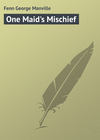Loe raamatut: «One Maid's Mischief», lehekülg 19
“That’s an unpleasant emergency that it is not worth while to consider until we know that negotiations have failed. It is unpleasant, dear boy, because I suppose we should then get a taste of kris, applied in a dexterous manner peculiar to the Malays, through the hollow of the left shoulder. But that would only be a dernier ressort, and a thousand things might happen in the meantime. It will all come right in the end.”
Seeing that Chumbley was determined to make the best of their position, Hilton gradually began to take somewhat of the same tone; and agreeing with his friend that at present any attempt at escape would be folly, he partook heartily of the excellent second meal provided for them, questioned their guard, but obtained no information whatever as to where they were and why they had been brought, and ended by seating himself by the open window and listening to the weird noises of the jungle as darkness fell.
Feeling weary at last, Hilton sought his couch, and lay thinking once more of Helen, wondering where she was, but with less excitement than of old; and somehow the sweet, earnest face of Grey Stuart rose like a pleasant picture before him, as he fell asleep, thinking that if Helen, with her beauteous face, had only had the sweet disposition of her schoolfellow and companion, what a lovable woman she would have been.
Chumbley was dropping off to sleep at the same time, and he too was thinking of Helen Perowne, and that nature was guilty of making a great mistake in sending such girls abroad upon the earth.
“In fact,” said Chumbley, who was in a drowsy state of content with the rest, good meals, wine and coffee – “in fact, old fellow, I begin to think that women are a great mistake altogether, and I for one am perfectly cured.”
Sleep spread her drowsy wings over his eyes at this point, and his heretical notions had no farther play, for his slumber was dreamless, and he like his friend passed a calm and pleasant night.
They awoke early, and breakfasted in keeping with their time of rising; after which, finding themselves quite alone, and seeing that they were not watched, they had a good quiet investigation of the place, doing what Chumbley called, “a bit of engineering.”
“Don’t seem feasible at present,” said Chumbley at the end of the look round.
“Unless we could bribe the guards,” replied Hilton.
“Yes, it would only be throwing away energy just at present. Let’s bide a wee, as old Stuart would say. I say, old chap, talk about old Stuart, why don’t you marry his pretty little lassie?”
“Why don’t you keep that Solomon-like intellect of yours to bear on the subject in hand?” retorted Hilton. “I’ve done with women.”
“So have I,” said Chumbley. “I’d turn monk if I were offered a nice cell with good shooting and fishing.”
“You’re a queer fish yourself, Chum,” said Hilton, laughing; “but seriously, we must get away from here. It is perfectly absurd! Kidnapped, and nothing else!”
“Quite a romance,” replied Chumbley; “but never mind. We shall know what our ransom is to be to-night.”
“I wonder whether Harley is taking steps to find us?”
“Sure to be, unless he thinks we are drowned,” replied Chumbley. “There’s no knowing. I believe my hat went floating down the river.”
“I hope not,” said Hilton. “If he thought that he would not search for us.”
“Not till he heard about the ransom. I say, old fellow, I’m tired of smoking, I wonder whether they have a billiard table, or chess?”
“Pshaw.”
“Well, then, a pea-rifle to pot the birds.”
“Very likely,” said Hilton, drily, as they sat by the open window, looking out at the soft shadows of the coming night.
“I’d give something to know really why we are boxed up here,” said Chumbley, after a long silence. “It can’t be anything connected with the station, or I should be in a terrible fidget. It must be something to do with us alone.”
“Yes,” replied Hilton; “but it is all darkness at present.”
For the moment it was; but the light came all at once as they sat there having a similar conversation on the evening of the third day, after vainly trying to get some information from their guard, for just before sunset the door was thrown open, and looking very handsome and picturesque, and evidently as if she had paid great attention to her toilet, the Inche Maida entered; and as the two officers started up, she walked straight towards Hilton with extended hand.
Volume Two – Chapter Sixteen.
At Fault Again
“They’ll find out the value of that woman now,” said Dr Bolter to himself; “and if I haven’t done wisely in marrying her, I’m a Dutchman! Why, it’s the very thing! Here am I, Henry Bolter, a duly qualified medical man, physician and surgeon in one, ready to afford bodily relief; and here is Mary Bolter, my wife – fine sound about that,” he said, smiling with satisfaction – “my wife – my little wife – no, my wife is best; it sounds more dignified – my wife, ready to afford mental relief wherever it is needed; and here she is.”
For just then the quick, pattering step of the little lady was heard, and, reticule on arm, she came in bustling, hot, and red-faced.
“Well, my little woman, how are you getting on?” he said cheerily, as he placed his arm round the buxom little waist, and led her to an easy-chair, proceeding afterwards, with all a youth’s tenderness, to take off her broad hat and light scarf, which he carefully laid down for fear of being called to account.
“Oh, don’t ask me, Henry,” she sighed. “My heart is nearly broken with trouble, and I am doing no good at all.”
“Ahem!” ejaculated the doctor, taking her hand and feeling the pulse.
“Don’t be foolish, Henry, dear,” she exclaimed.
“Foolish? No, my dear, certainly not. Hum! Hah! Much fever and exhaustion. Recipe vin Xeres, cochleare magnum. Brisk osculation after the medicine.”
“What?” exclaimed Mrs Bolter.
“You are suffering from weariness and exhaustion, my dear,” said the little doctor; “and I have prescribed for you a drop of sherry, and something to take after it.”
“Not sugar, Henry? and really I would rather not have the wine.”
“Doctor’s orders, my dear. There,” he said, pouring the sherry into a tumbler, and filling it up with cold water, “I have made it as refreshing as I could.”
Mrs Bolter drank off the draught, and made a wry face, holding out her hand.
“Where is the stuff for me to take afterwards?”
“There, my dear,” said the doctor, kissing her very tenderly.
“For shame, Henry!” she cried, blushing like a girl. “Suppose anyone had seen you?”
“Well, it would have been like his or her impudence to look; and if it had been talked about afterwards, really, Mary, my dear, I have grown to be such a hardened sinner over that sort of thing that I shouldn’t care a bit.”
“Really, Henry,” said the little lady, “anyone would think you were a boy, instead of being a middle-aged man.”
“I feel quite a boy,” he said, merrily. “At least, I should if we were not in such trouble.”
“And we are, Henry, indeed,” said the little lady, sadly. “I’m afraid I’m neglecting you terribly, my dear; but I am obliged to try and help that poor man, who is completely prostrate; and if it was not for the help Grey Stuart gives me, I’m sure I should break down. Have you any news?”
“Not a scrap, my dear. Have you?”
“None whatever. But now really, Henry, what do you think of the matter?”
“’Pon my word, my dear, I don’t know what to think.”
“Don’t say you believe they have had a boat accident, dear. I cannot bear to think it possible.”
“No, my dear, I don’t, and I cannot believe it,” he replied. “Here is the case: For there to have been a boat accident, Helen, Arthur, Hilton, and Chumbley must have taken a boat, and they must have all gone in together.”
“Or Hilton may have been trying to carry Helen away, and Chumbley and Arthur, who is as brave as a lion in such matters, may have been trying to stop them, or pursued them in a second boat.”
“And a struggle ensued, and the boats upset, eh?”
“Yes, dear,” said Mrs Bolter, with a shudder. “Oh, why did you bring us out here, Henry, for such horrors to happen?”
“I did not know that these horrors had happened, my dear,” said the doctor, drily. “Let’s see first if the boat theory holds water. I don’t believe it does.”
“Then you think Murad is at the bottom of it?” she said, sharply.
“I’m for and against,” he replied. “Let’s wait and see. I don’t believe, however, that they are dead.”
“Oh, no – oh, no!” said Mrs Bolter, shuddering. “I cannot believe that. I’m afraid it’s all due, in some way, to Helen’s folly.”
“Yes, my dear,” said the doctor, “and it has quite upset my intended journey in search of the true Ophir.”
“And that’s your folly. Oh, Henry, how much happier I should be if you would give up that weakness of yours.”
“Sorry I can’t, Mary. It’s an old weakness that increases with age. Don’t be angry with me, my dear.”
“I am not angry, Henry; only you do worry me when you will keep talking about Solomon’s ships coming here for gold.”
“If they’d come here for gold, and you had been living at the time, they would have carried you off, for you are richer than refined – ”
“Now, Henry, I will not sit here and listen to such outrageous flattery of a very ordinary little woman,” said the lady, looking angry, but feeling pleased. “You must be a very weak man to have taken a fancy to me.”
“Let me be weak then, my dear,” said the little doctor.
“Hush!” exclaimed the lady. “Here is Grey Stuart at the gate;” and they listened to the click of the Chinese-made bamboo latch, and directly after, looking thin and pale, Helen’s schoolfellow was admitted.
She did not speak, but looked at Mrs Bolter in a weary, dejected manner, that made the little lady take her in her arms, kiss her tenderly, and then place her beside her upon the couch.
“Never despair, my dear,” she said, cheerily. “There’s always room for hope.”
“That is what I have been trying to think for days past,” sighed Grey; “but the trouble only seems to grow darker.”
“Don’t say that, my dear,” exclaimed Mrs Bolter. “For my part, I will not believe the story of the boat accident; and I have always this consolation – that wherever that foolish girl may be, she has my brother by her side.”
Mrs Bolter felt her cheeks burn a little as she said this; for in her heart of hearts she had not the faith in her brother’s prudence and ability to protect a lady that she professed.
She glanced at the doctor, and her face became a little hotter, for he too was watching her, and she felt that he was reading her thoughts.
“I will try and be as hopeful as you are, dear Mrs Bolter; but it is very hard!”
“Bless the child! I did not think she felt so warm an affection for Helen Perowne,” thought Mrs Bolter; “but it shows how good a heart she has.”
Then aloud:
“Oh, how tiresome! Here is that dreadful Mrs Barlow coming!”
“Say I’m out, my dear,” whispered the doctor, hurriedly. “I’ll slip round through the surgery.”
“I cannot say you are out, Henry,” said the little lady, reprovingly; “but I will say that you are particularly engaged.”
“Yes, my dear – an operation,” whispered the doctor.
“I shall say nothing of the kind, Harry!” exclaimed Mrs Bolter, sternly.
“But she will want to see me, and describe her symptoms.”
“Then she cannot see you,” replied the little lady, with dignity. “I will take care of that.”
Dr Bolter stepped out by one door, and he had hardly closed it after him, when Mrs Barlow entered by the other.
“Ah, my dear Mrs Bolter,” she sobbed, kissing her in spite of a strong objection evinced by the little lady. “Ah, my dear Miss Stuart, these are terrible times.”
She paused, as if expecting one of those she addressed to speak; but save for acknowledging her salutation, they remained silent. “Have you heard the last news?”
“No,” replied Mrs Bolter, quickly. “Quick! what is it?”
“A couple of boatmen have come in just now with some more relics of our missing party.”
“What relics?” cried Mrs Bolter, as Grey turned deadly pale.
“They have found some scraps of clothing, I believe, and a hat,” said the lady.
“Where? Where are they?” cried Dr Bolter, coming in hurriedly, for he had been waiting by the door in the not very creditable position of an eavesdropper.
“Oh, doctor, how you startled me! I wanted to see you?” exclaimed Mrs Barlow. “I fear I am going to have a bad attack of illness!”
Dr Bolter was saved from a bad attack of Mrs Barlow’s symptoms, described to him at full length, by the opportune arrival of Harley.
“Here, Bolter, I want you,” he said, hastily; and making his excuses for having to leave, the doctor hurried out and joined Mr Harley in the garden.
“You have had something brought in,” said the doctor, hastily. “Where is it?”
“Down by the landing-stage. Perowne has got up from his bed to come and see, and Stuart, Murad, and others are down there inspecting them.”
The doctor accompanied the Resident to the landing-stage, where, in the midst of a little group, lay some wet and torn rags and a sodden hat, muddied and out of shape; while, squatting hard by the foul garments, were a couple of Malay fishermen, who had found the scraps and other articles amongst the mangrove-roots miles away.
Dr Bolter threw off his coat and rolled up his sleeves to go down on one knee by the muddy bank, while with contracted eyes and puckered brow the young Rajah looked on.
“What do you make of them, doctor?” said the Resident, hoarsely.
“Lady’s silk dress that has not been taken off, but dragged from its hooks, and ripped and torn away. It seems to have been rolled over and over in the tide till it became fastened on to some snag.”
A shudder ran through the little party, and the doctor continued his examination.
“Hat,” he said, turning it over. “Dreadfully battered and soaked; but it is Chumbley’s, I think.”
“What is that?” said Mr Harley, in a low voice.
“Coat,” said the doctor. “Gentleman’s; and this is a small white tie.”
“Here is a handkerchief,” said old Stuart, picking up what looked to be a mere wisp.
This the doctor took and rinsed in the clear river, starting back on the instant, and only just in time for, attracted by the motion of the white handkerchief in the water, a small crocodile of some six feet long partially threw itself out of the stream; but falling short of its prey, the reptile shuffled back and was gone.
No one spoke; but the presence of these creatures in such abundance, combined with their daring, whispered plainly enough to the party assembled what must be the fate of one who was thrown out into the stream.
The doctor took a step or two back, and then, as coolly as if nothing had occurred, he shook out the folds of the handkerchief – one of a very delicate texture and edged with lace, while in one corner were the two letters, “H.P.,” embroidered by a woman’s hand.
There was a deep groan here, and as the gentlemen turned, it was to see that Murad was resting his face upon a bamboo fence, his hands to his brow, and, turned from them as he was, the lookers-on could see that his breast was heaving, and that the young man was suffering great agony of mind.
“Collect all these together,” said the doctor in a whisper; and one of the soldiers proceeded to obey his orders, when the young Malay leaped upon him fiercely, and tore the handkerchief from his grasp, thrust it into his bosom, and strode away.
The Resident did not move, but stood gazing after the Sultan, his brows contracted, and a peculiar look of dislike gathering in his eyes; but he did not speak, and without a word the various relics were gathered into a basket and carried across to the Residency island, where Dr Bolter announced that he would make a further and more searching examination.
Then the party separated, save that the doctor and Neil Harley had a long conversation together, in which the latter related how thoroughly the river banks had now been searched by the boats enlisted to carry the soldiers, who were most energetically aided by the people belonging to Rajah Murad and the Inche Maida, both of whom continued to almost live at the station, only going away for a few hours at a time to see to their own affairs, journeys from which they came back, with the rowers of the small boats they used looking terribly distressed.
“You can trust me, Harley,” said the doctor. “I will not chatter, even to my wife, though she is to be trusted, too. How do you feel about the matter now?”
“Feel!” said Neil Harley, quietly. “I feel that little Miss Stuart was right in what she said to me.”
“And what was that?”
“That this is a contest between the wits of the Eastern and the European; that we are being deceived; and that Sultan Murad is playing a part.”
“What, after the miserable relics we have just seen?”
“After the miserable relics we have just seen. He has slaves who would die in his service, and who would consider it a merit to deceive the heathen English.”
“Then he is playing his part marvellously well,” said the doctor.
“Magnificently; and if Miss Stuart is right, as I believe she is, for the simple reason that her ideas accord with mine, he is a born actor. That show of grief, and that seizure of the pocket-handkerchief were admirably done.”
“If you believe all this, then,” said the doctor, “why not boldly charge him with the crime!”
“To create a little war, with no better reason than my suspicions? A charge made in face of the most earnest work – while he is striving might and main to serve us.”
“Apparently,” said the doctor.
“Yes, apparently. But you see my position. Here are our two friendly natives both offended, but professing forgiveness, and working for us. I cannot charge them on bare suspicion. I must have some proof.”
“Then why not search land as well as river?”
“How?” said the Resident. “Be reasonable, Bolter. You know as well as I do that the rivers and streams are almost the only roads here. To penetrate elsewhere is to cut your way through the dense jungle. Say I determine to offend the Prince and Princess, and take soldiers, saying I mean to search their little towns, what good would that do?”
“None, certainly,” said the doctor. “They would not leave their prisoners there if they are prisoners.”
“You doubt, then?”
“I doubt, and I don’t doubt. I am not a diplomat, Harley. This is out of my line. If you have a pain, and give me your symptoms, I’ll tell you what causes that pain. I can cut you anywhere without injuring an important artery, nerve, or vein; and I can extract bullets, cure fevers, mend broken bones. I can also classify most of the natural history objects of our district; but over a job like this we have in hand I am at sea. Try Mrs Bolter or Grey Stuart – they will counsel you better than I. Tell me, though, are you going to do anything?”
“Yes. In confidence, I do not trust either Murad or the Inche Maida. This may all be some deeply-laid plot of both to obtain revenge; perhaps to begin ousting us from this place, where we are looked upon with jealousy.”
“Yes, very likely; but what are you going to do?”
“Meet Eastern cunning with Eastern cunning. I am about to employ some people from lower down the river who are now seeking alliance with us, seeing how well it pays.”
“What, as spies?”
“Yes,” said the Resident, quietly. “I do not believe in the present theory of the disappearance, so I shall try these people. If Murad is playing us false, why then – ”
“Well, why don’t you finish?”
“I fear,” said the Resident, fiercely, “that I shall go farther than to exact stern justice for this act; for when a man’s feelings are touched as mine are now – ”
He did not finish, but turned sharply away, as if all this was more than he could bear.
That night the doctor whispered to his wife to keep her counsel, and not to fret about those who were lost, for Neil Harley was deeply moved; and if something startling did not come out of it before many days were past, he, Dr Bolter, was no man.
Volume Two – Chapter Seventeen.
Becoming Humbled
The secret of the peculiarly-scented water was explained: it was a stain, prepared for the purpose, and face, neck, hands, arms were no longer those of Helen Perowne – whose complexion was acknowledged even by her detractors to be perfect – for as she again gazed within the limits of that little badly-reflecting glass, it was to see that her countenance now was as swarthy as that of the darkest of the Malays by whom she was attended.
It was a great shock; but there was a trouble even worse to come.
The two Malay girls burst into fits of laughter as they saw her horror, their eyes glittering with malicious pleasure; and catching Helen’s arms in their hands, they laid them side by side with their own, to show her that they were as nearly as could be of about the same hue.
Then they mockingly pointed to her face, and to their own, holding the glass before her again and again, while from the smattering she knew of the language, Helen made out that they were telling her how beautiful she looked now, and that she ought to be grateful for that which they had done.
By degrees, though, the anguish she was suffering seemed to be realised, and to wake an echo in their coarser minds, and they began to soften towards her, speaking tenderly, and patting her hands and cheeks, and at last going so far as to kiss her, as they whispered what were evidently meant to be words of comfort.
“You foolish thing,” cried the elder of the two; “what is there so dreadful in it all? He loves you, and you will be his chief wife. It is we who ought to weep, not you.”
“Yes,” cried the other, apparently quite oblivious of the fact that only about one word in ten was comprehended by the prisoner; “we are jealous of you, for you take away his love from us. The Rajah has talked about you for a long time, saying how lovely you were, only that you were so fair.”
“I hate you,” cried the first; “but I will not be cruel, for you are in trouble. You have been brought away from your father. I remember so well how I was ready to beat my head against the trees, and to drown myself in the river, when they brought me from my home. But Murad was very angry when I wept, and after a time I learned how to bear my sorrow, and I wept no more.”
“I wept, too,” said the other, “for I loved a handsome young fisherman, and when they dragged me away from my home I fought, and bit, and tore people, and Murad said I was to be krissed and thrown into the river. Then I thought about the crocodiles, and I felt that it would be too dreadful, and I left off crying, and so will you. There, try and bear it, for it is of no avail to weep. Murad is prince, and what he will have he has.”
Hardly one word in ten, but the recurrence of the name “Murad” and “love” were sufficient to make her suspicions certainties; and as she fully realised the extent of her trouble, she shuddered, and sat with her hands tightly clasped, gazing into vacancy, and asking herself what madness had been hers that she should have allowed her folly to bring her to so sad a pass.
She was soon after left to herself, and leaving the matting divan upon which she had been seated, she paced the room, frantically trying door and windows in turn, but only to find all fast. Again and again she found her follies recurring to her mind, and she blamed herself bitterly for her coquetry, and the thoughtless love of admiration which had tempted her to attract the Rajah’s notice.
So terribly agitating were her thoughts now, that in her excitement her hands shook, her legs trembled beneath her weight, and her busy imagination coursed on so swiftly that she saw herself the injured, helpless wife of the insulted Malay, the occupant of a zenana, and the slave of the man whom she had maddened by her weakness and folly.
It was terrible; and so black did the future outlook become to her excited imagination, that the only gleam of hope through the darkness was represented by a shuddering belief that it would be better now to die.
Carried off as she had been, unknown to any but the Rajah’s followers, and now hidden away in this place, that seemed to be far in the depths of the jungle, there seemed no chance of her whereabouts being discovered; while were it known to any European who should see her, upon what would he gaze but one who was in his eyes an ordinary Malay woman!
This, then, was the goal to which her ambition had carried her. It was for this that she had laughed at the protestations of her many admirers, the humblest of whom she would gladly have accepted now sooner than become the wife, or rather slave, of this petty, half-savage Rajah.
“Poor Hilton!” she thought sadly to herself, as she stood by the window, gazing out at the great green leaves of the jungle. Would he suffer much at her loss? or, feeling too indignant on account of her late treatment, be too angry to care?
Then she began thinking of Chumbley, and wished that he, with his strong arm, were by her side to protect her in this hour of need; and it was a bitter humiliation to her to feel that this man, towards whom she had always felt a kind of good-humoured contempt, should be one to whom she was ready to cling in the time of adversity.
Then the calm, pensive features of Arthur Rosebury seemed to rise before her like an upbraiding spectre, and she, for the first time, seemed to see her cruelty in trifling with the best feelings of a man who was gentle, tender, and true of heart as a woman; she knew now how she must have wounded him, and yet he had borne it all in a patient, uncomplaining way, bearing with her follies, displaying no jealousy, but condoning everything, and seeming only too happy if she paid him with a smile.
There was something very nearly akin to pity and regret in her thoughts at this time; and like some punished child, there came to her mind weak, repentant vows of amendment and simple promises never to do so again.
Lastly, the face of Neil Harley seemed to rise before her, not pitying or pleading like the rest, but with a quiet smile of triumph that made her think upon his words, and what is more, set her longing for him to be by her side to help and protect her.
She passed her hands across her eyes angrily, and seemed to disclaim the wish, but directly after came the recollection of her state, and she uttered a weary cry of misery. She had despised him before – he would despise her now; and if he could see her as she had seen herself in that mirror, he would turn from her in disgust.
She pondered again, as she grew calmer, upon his words to her, uttered as they had been in his quiet, bantering way – that he would wait his time till she was weary of trifling with others, when she would turn to him and gladly become his wife.
Never until now had Helen felt how true these words might prove, for as she rested her burning forehead against the bamboo trellis of her window, asking the outer air to cool her fevered face – that face that he would never look upon again with the eyes of love – his calm, grave manner of dealing with others seemed so representative of power and readiness to help, that her heart went out to him as to her natural protector, and in a low, passionate voice, she murmured:
“Neil – Neil – come to me before it is too late!”
Then came once more as it were a wave of despair to sweep over her and overwhelm her in misery and despair.
“It is too late – too late,” she moaned. “I might have been happy and at peace, but it is too late – too late.”
As she stood there wringing her hands, she found herself thinking more and more of Neil Harley, and she saw now what she had been too indifferent to appreciate before; that beneath his calm, half-mocking mien there was a depth of affection that she now began to realise to its fullest extent.
And yet he had borne with her follies patiently, merely laughing at acts that she knew now must have given him great pain, doubtless feeling that some day she would sorrow for what she had done, and seek by her affection to recompense him for all that had gone before.
Her heart told her, now that she did turn to him – that she was feeling the strength of his love in the echo it met with in her own heart. She had not known that it was there – this love for him – but it surely was; and now her punishment was to be a terrible one – that of one torn by regret for the love that might have been hers, but which she had cast away.
For it was too late now – too late, and those words seemed to be ever repeating themselves in her ears.
She had never cared for either of those who had been her slaves in turn. Their attentions and service had been pleasant, and they had been in favour for the time; but she soon wearied of them, and but for the fact that Captain Hilton was cast in a firmer mould than either of the others, the days of his love-slavery would have been shorter far. Would he come and try to save her? her heart asked – would Neil Harley come?
She asked this again and again, but each time, with crushing violence, the answer seemed to come that if they did, it would be too late – too late.
It was wonderful how, in the few hours she was left alone, her thoughts seemed now to centre upon the Resident. She remembered her father, and thought of how he would be troubled at her absence; and she recalled Hilton, Chumbley, the Reverend Arthur Rosebury, but only as subsidiary portraits in her mental picture. Neil Harley’s was the principal figure, and his face seemed to smile now encouragement to her as she mentally appealed to him for help, looking to him as the one whose duty it was to afford her protection, and save her from the perils which hemmed her in.
“It will he – it is – a bitter lesson to me,” she thought, as she grew more calm. “He will find out where I am – he will never rest until he does; and when he sees me will he cast me off? No,” she cried, hysterically; “he will have pity on me – have pity – for, oh, Heaven help me! I need it now sorely.”
These thoughts brought calmness to the prisoner, and uttering a sigh of relief, she left the window, and threw herself wearily upon the soft mats spread for her use – neither chair nor table being in the apartment – and there she reclined, wondering how long a time would elapse before Neil Harley could come to her help; for minute by minute her belief strengthened that, well supported by her friends, he would soon be there.




















